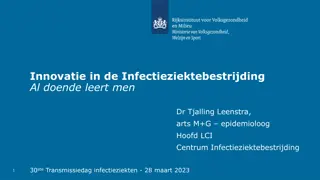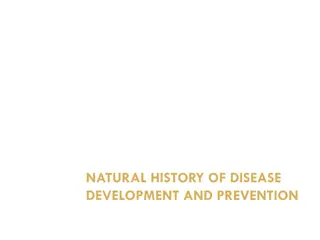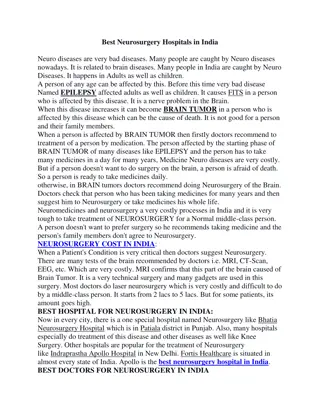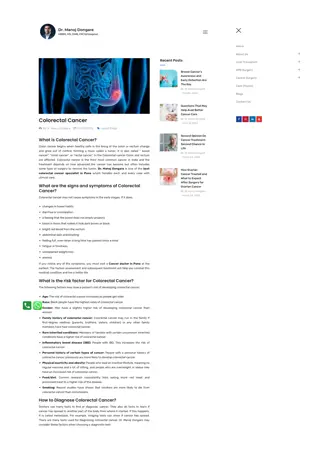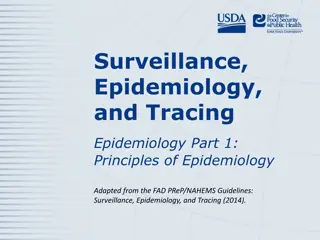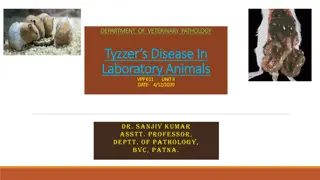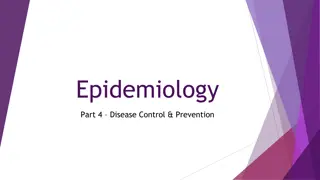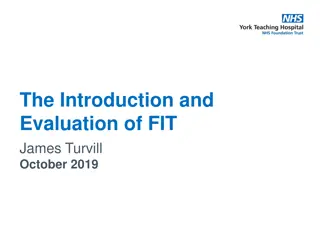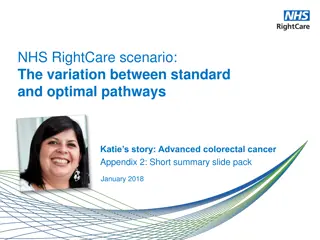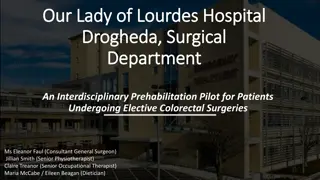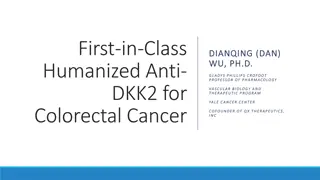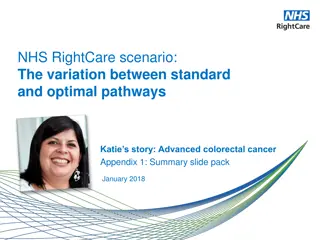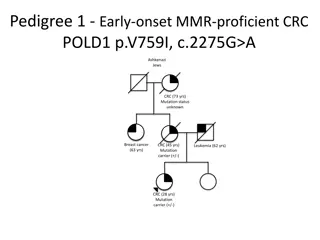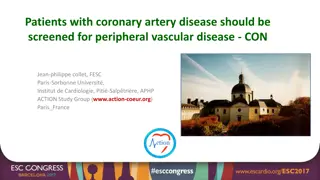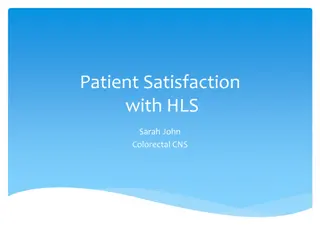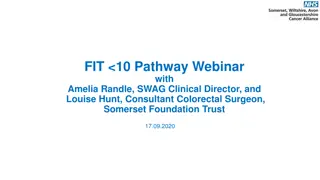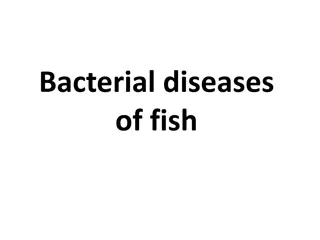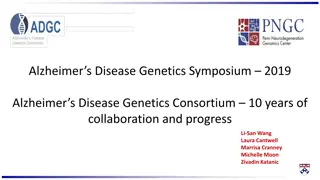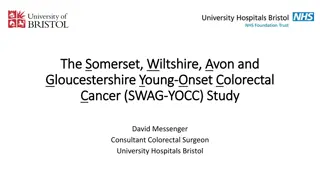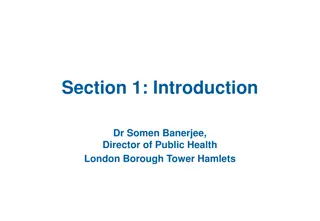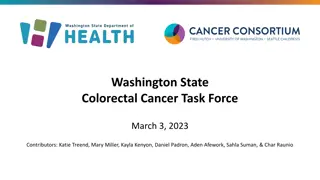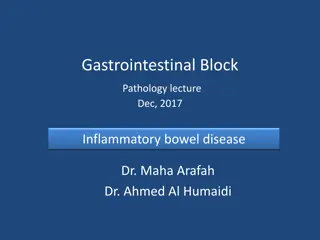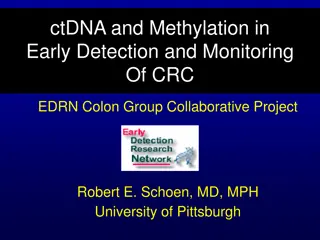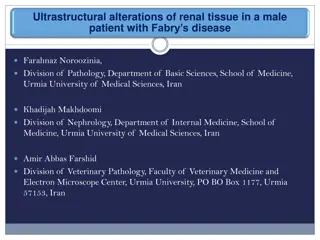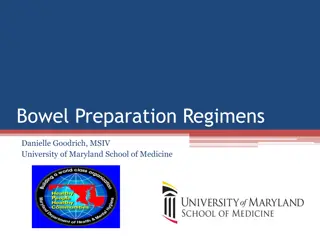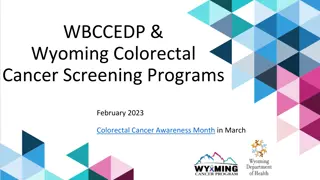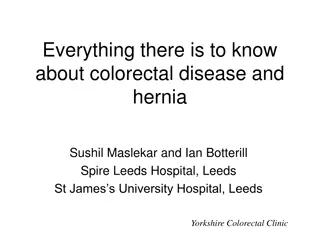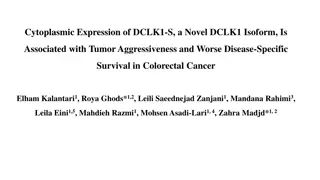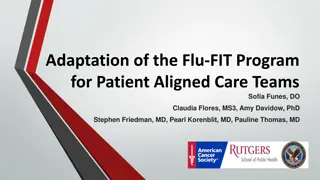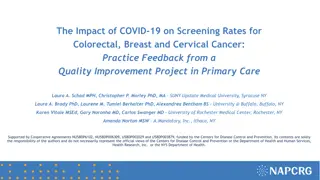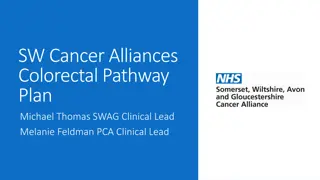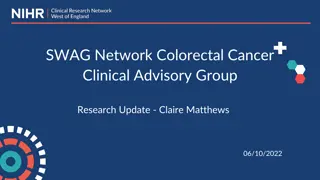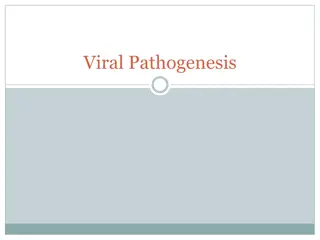Understanding Steatotic Liver Disease: Importance, Epidemiology, and Pathology
Steatotic liver disease, including metabolic dysfunction associated steatohepatitis (MASLD) and metabolic associated alcoholic liver disease (MALD), is a common cause of liver test abnormalities in the United States. Risk factors such as obesity and metabolic syndrome can lead to advanced fibrosis a
2 views • 44 slides
Innovations in Infectious Disease Control: Insights from Experts
Explore the latest advancements in infectious disease control through the lens of renowned epidemiologists and researchers. Delve into the impact of the COVID-19 pandemic, the historical prevalence of infectious diseases, and early infection prevention practices. Uncover the evolution of infectious
0 views • 22 slides
Understanding the Natural History of Disease Development and Prevention
The natural history of disease development outlines the progression of a disease in an individual without intervention, from exposure to outcome. Learning objectives include defining prevention terms, understanding disease severity, prevention levels, and intervention measures. Studying disease prog
4 views • 16 slides
Best Neurosurgery Hospitals in India
Neuro diseases are very bad diseases. Many people are caught by Neuro diseases nowadays. It is related to brain diseases. Many people in India are caught by Neuro Diseases. It happens in Adults as well as children.\nA person of any age can be affected by this. Before this time very bad disease Named
1 views • 2 slides
Colorectal Cancer Treatment in Wakad Pune - Dr. Manoj Dongare
Dr. Manoj Dongare is one of the best colorectal cancer specialist in Pune which handles each and every case with utmost care. In his surgical experience, he performs many colorectal cancer surgeries successfully. His expertise in colorectal cancer surgery and surgical oncology makes him one of the b
0 views • 3 slides
Principles of Epidemiology: Understanding Disease Occurrence and Surveillance
Epidemiology is the study of disease patterns, factors influencing disease occurrence, and the core functions of surveillance, field investigation, and analytic studies. It involves understanding disease characteristics, natural history, and evaluating the effectiveness of activities to mitigate dis
1 views • 25 slides
Insights into Tyzzer's Disease: An Overview of a Bacterial Infection in Laboratory Animals
Tyzzer's disease is an acute bacterial infection affecting rodents and rabbits, caused by Clostridium piliforme. Discovered in 1917 by Ernest Tyzzer, the disease is characterized by necrotic lesions in the caecal mucosa, liver, and heart. Initially known as Bacillus piliformis, it was later renamed
2 views • 21 slides
Understanding Disease Control and Prevention in Epidemiology
This article discusses disease control processes in epidemiology, including reducing disease incidence, duration, and transmission. It covers public policy interventions, elimination, eradication, and extinction of infectious agents. It also highlights preventable causes of disease and different lev
2 views • 10 slides
Overview of Faecal Immunochemical Test (FIT) and Faecal Calprotectin in Colorectal Screening
Introduction and evaluation of Faecal Immunochemical Test (FIT) and Faecal Calprotectin for colorectal cancer screening, focusing on the indications for use, exclusion criteria, economic evaluation, and comparison with standard care. Information includes age-specific screening recommendations, diffe
0 views • 31 slides
Contrasting Pathways in Colorectal Cancer Care: Katie's Story
Katie's journey with advanced colorectal cancer showcases the stark differences between a sub-optimal pathway, marked by delayed diagnosis, ineffective treatment, and inadequate palliative care, and an optimal pathway characterized by timely referrals, comprehensive support, and personalized care pl
2 views • 9 slides
Interdisciplinary Prehabilitation Pilot for Elective Colorectal Surgeries at Our Lady of Lourdes Hospital
Our Lady of Lourdes Hospital in Drogheda initiated an interdisciplinary prehabilitation pilot program for patients undergoing elective colorectal surgeries. The program aims to reduce length of stay by addressing modifiable risk factors and optimizing patients' physiological reserve. By targeting po
0 views • 4 slides
First-in-Class Humanized Anti-DKK2 for Colorectal Cancer
Strong association of clinical biomarker - elevated DKK2 correlates with poor CRC prognosis. First-in-class therapeutic for colorectal cancer, targeting MSS CRC with multiple novel mechanisms of action and low risk for side effects. Complements current treatments like bevacizumab and shows efficacy
2 views • 11 slides
Improving Care Pathways for Advanced Colorectal Cancer Patients: A Case Study
This case study highlights Katie's journey through an advanced colorectal cancer care pathway, comparing a sub-optimal scenario with an ideal pathway. It emphasizes the importance of utilizing NHS RightCare methodology to enhance outcomes and value in healthcare delivery. The narrative reflects the
0 views • 14 slides
Understanding Bowel Cancer: Facts, Prevention, and Awareness Efforts
Bowel cancer, also known as colorectal cancer, is a significant health concern, being the fourth most common cancer in the UK. It is essential to be aware of the symptoms, risk factors, and preventive measures associated with this condition. By maintaining a healthy diet, managing body weight, and s
0 views • 9 slides
Improving Colorectal Cancer Referrals Using FIT Pathway
The FIT Pathway for suspected colorectal cancer aims to optimize referrals amidst reduced endoscopy availability due to the pandemic. By utilizing the Faecal Immunochemical Test (FIT) to triage patients, it allows for the prioritization of urgent cases, reducing the number of unnecessary colonoscopi
0 views • 34 slides
Familial Colorectal Cancer Syndromes: Genetic Profiles and Clinical Presentations
These pedigrees depict familial colorectal cancer syndromes in Ashkenazi and Iraqi Jews, showcasing early-onset MMR-proficient CRC cases linked to mutations in POLD1 and POLE genes. The pedigrees detail various cancer diagnoses, mutation carrier statuses, and ages of onset across multiple generation
0 views • 5 slides
Screening for Peripheral Vascular Disease in Patients with Coronary Artery Disease
Patients with coronary artery disease should be screened for peripheral vascular disease as it is a frequent integrator of global cardiovascular risk. The association of atherosclerosis in various arterial diseases highlights the importance of identifying multisite artery disease. The prevalence and
0 views • 23 slides
Patient Satisfaction with HLS Programme and Colorectal Surgery Outcomes
Patients express high satisfaction with their experience in the HLS programme, reporting confidence in the care provided and timely test results. Colorectal surgery outcomes show positive results with disease-free patients and successful resections. The decision to defer surgery for sustained cCR is
0 views • 10 slides
Human Disease Symptom Network: Understanding Disease Relationships Through Symptoms and Genes
The Human Disease Symptom Network (HSDN) is constructed using a large-scale medical bibliographic records database to form a network of human diseases based on symptom similarities. By integrating disease-gene associations and protein-protein interaction data, correlations between symptom similarity
0 views • 37 slides
Managing Colorectal Cancer Referrals during COVID-19 Pandemic
The availability of colonoscopy has been impacted by the pandemic, leading to the adoption of Faecal Immunochemical Testing (FIT) for triaging suspected colorectal cancer referrals. Utilizing FIT results, negative patients are placed on a waiting list for later colonoscopy, allowing quicker assessme
0 views • 34 slides
Colorectal Cancer Projects Overview
This document outlines two projects conducted by the GI Collaborative Group focused on detecting and monitoring colorectal cancer using plasma protein markers and ctDNA/aberrantly methylated DNA markers. Project 1 aims to develop a panel of plasma biomarkers for the detection of adenomas and CRC, wh
0 views • 7 slides
Understanding Bacterial Diseases of Fish: Columnaris Disease Overview
Columnaris disease, also known as Saddleback disease, is a common bacterial infection in fish that is often brought about by poor handling and high stress levels. This disease manifests as tail and fin rot, leading to rapid fish mortality. The causative organism, Cytophaga (formerly Flexibacter), is
0 views • 21 slides
Decoding Genetics: Insights from Alzheimer's Disease Symposium to Type 2 Diabetes Study
Explore the latest findings from the Alzheimer's Disease Genetics Symposium 2019 on disease mechanisms, drug targets, and genetic pathways. Dive into the progress made by the Alzheimer's Disease Genetics Consortium over the past decade. Transition to a Genome-Wide Association Study uncovering suscep
0 views • 42 slides
Global Cancer Statistics and Trends
The data presented showcases global cancer statistics from various years, highlighting the prevalence of different types of cancer across genders. It includes information on the estimated number of cancer cases, common types of cancers, and trends expected up to 2035. Lung cancer, breast cancer, and
0 views • 83 slides
Study on Young Onset Colorectal Cancer in Southwest England
The study focuses on young adults under 50 diagnosed with colorectal cancer in the Somerset, Wiltshire, Avon, and Gloucestershire regions. It aims to capture data on their epidemiology, diagnostic pathways, management, and outcomes from 2009 to 2019. The background and incidence trends both globally
0 views • 24 slides
Liver Disease Burden in Tower Hamlets
Dr. Somen Banerjee, Director of Public Health in London Borough Tower Hamlets, highlights the concerning liver disease mortality rates in the area, with high incidence of cirrhosis, cancer, and hepatitis B and C. The data reveals a significant burden of liver diseases such as Non-Alcoholic Fatty Liv
0 views • 18 slides
Washington State Colorectal Cancer Task Force - March 3, 2023 Update
The Washington State Colorectal Cancer Task Force met on March 3, 2023, with contributors Katie Treend, Mary Miller, Kayla Kenyon, Daniel Padron, Aden Afework, Sahla Suman, and Char Raunio. The agenda included introductions, history, brainstorming, and future plans, highlighting the Task Force's jou
0 views • 12 slides
Understanding Inflammatory Bowel Disease: Crohn's Disease and Ulcerative Colitis
Inflammatory Bowel Disease (IBD) encompasses Crohn's disease (CD) and ulcerative colitis (UC), chronic conditions with immunologic basis. This article delves into the epidemiology, pathophysiology, and differences between CD and UC, highlighting clinical features, pathology, and complications like a
0 views • 42 slides
Early Detection and Monitoring of Colorectal Cancer using ctDNA and Methylation
Blood tests for colorectal cancer (CRC) screening can enhance compliance and options for testing. Markers like ctDNA and aberrantly methylated genes provide potential for early detection and monitoring of CRC recurrence. By combining these markers in plasma samples processed similarly, a more effect
0 views • 36 slides
Ultrastructural Alterations of Renal Tissue in a Male Patient with Fabry's Disease
Fabry's disease is a rare X-linked lipid storage disorder characterized by deficient lysosomal alpha-galactosidase A activity. This condition primarily affects males, leading to chronic kidney disease and progression to end-stage renal disease. Kidney involvement is a critical aspect, and high doses
0 views • 24 slides
Bowel Preparation Regimens for Colorectal Cancer Screening
Overview of bowel preparation regimens for colorectal cancer screening, emphasizing the importance of adequate bowel cleansing to enhance the effectiveness of colonoscopy. Highlights the impact of different dosing regimens on patient compliance, colon cleansing, and detection rates of small polyps.
0 views • 20 slides
Colorectal Cancer Awareness Initiatives in Wyoming
Wyoming's colorectal cancer screening programs and awareness initiatives for February and March 2023 aim to educate and encourage early detection through regular screenings. Updates on program changes and resources, including healthy recipes and the 80% screening pledge, are emphasized. Various medi
0 views • 13 slides
Cancer Types Spending in Europe
Learn about the spending on various types of cancer in Europe including breast cancer, colorectal cancer, prostate cancer, lung cancer, ovary cancer, and pancreatic cancer. The information is based on the Comparator Report on Cancer in Europe 2019, which covers disease burden, costs, and access to m
2 views • 7 slides
Understanding Colorectal Disease and Hernia: Comprehensive Overview
Exploring various aspects of colorectal disease and hernia, this overview covers symptoms, family history significance, approach to FHx issues, patient management based on FHx, new 2WW bowel cancer referral guidelines, and the use of faecal calprotectin as a marker. Detailed information provided by
0 views • 73 slides
Cytoplasmic Expression of DCLK1-S in Colorectal Cancer
Cytoplasmic expression of DCLK1-S, a novel isoform, is linked to tumor aggressiveness and poorer disease-specific survival in colorectal cancer. The study includes assessments of peptide conjugation, immunohistochemical staining in various tissues, and comparison of staining in colorectal cancer usi
0 views • 4 slides
Implementation of Flu-FIT Program for Patient Aligned Care Teams at East Orange VA
This study details the adaptation of the Flu-FIT Program to enhance colorectal cancer screening rates within patient aligned care teams at the Veterans Affairs (VA) Department. By linking influenza immunization with colorectal cancer screening using fecal immunochemical testing, the project aimed to
0 views • 10 slides
Impact of COVID-19 on Cancer Screening Rates in Primary Care
This study examines the impact of the COVID-19 pandemic on colorectal, breast, and cervical cancer screening rates in safety-net primary care practices. A 7-year Quality Improvement Project aimed to increase screening rates through tailored education and practice facilitation. The project faced chal
0 views • 5 slides
Transforming Colorectal Cancer Pathways in the South West
Colorectal cancer, the 4th most common cancer in the UK, presents challenges in timely diagnosis and treatment due to capacity issues in diagnostic services. The SW CRC Pathway Case for Change highlights the need for redesigning pathways to improve patient experiences and outcomes. National initiati
0 views • 14 slides
Updates on Colorectal Cancer Research in SWAG Network
Explore the latest research updates on colorectal cancer in the SWAG network, including recruitment data, regional studies, and ongoing clinical trials. Discover the comprehensive list of studies open for participation and those in setup, providing valuable insights into advancements in colorectal c
1 views • 13 slides
Understanding Viral Pathogenesis: Causes and Consequences
Viral pathogenesis involves the process by which a virus leads to disease, exploring the interplay between viral and host factors. It encompasses the concepts of virulence, viral disease, and the effects on infected cells and the host's immune response. Changes within infected cells, including cell
0 views • 26 slides

